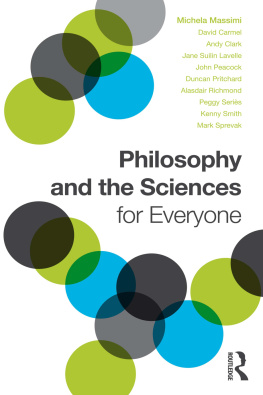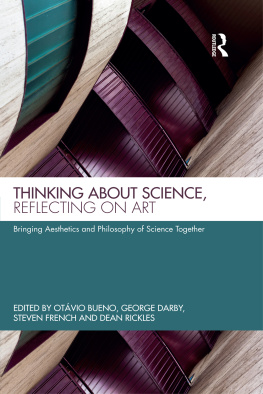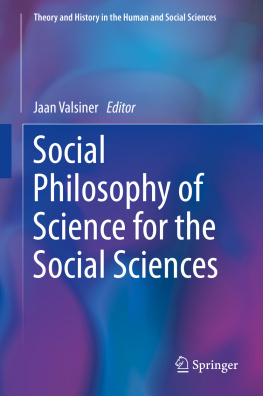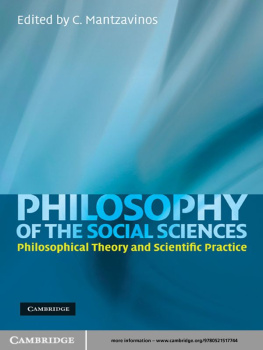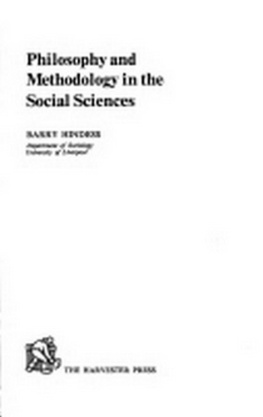Massimi - Philosophy and the Sciences for Everyone
Here you can read online Massimi - Philosophy and the Sciences for Everyone full text of the book (entire story) in english for free. Download pdf and epub, get meaning, cover and reviews about this ebook. year: 2014, publisher: Routledge, genre: Science. Description of the work, (preface) as well as reviews are available. Best literature library LitArk.com created for fans of good reading and offers a wide selection of genres:
Romance novel
Science fiction
Adventure
Detective
Science
History
Home and family
Prose
Art
Politics
Computer
Non-fiction
Religion
Business
Children
Humor
Choose a favorite category and find really read worthwhile books. Enjoy immersion in the world of imagination, feel the emotions of the characters or learn something new for yourself, make an fascinating discovery.
Philosophy and the Sciences for Everyone: summary, description and annotation
We offer to read an annotation, description, summary or preface (depends on what the author of the book "Philosophy and the Sciences for Everyone" wrote himself). If you haven't found the necessary information about the book — write in the comments, we will try to find it.
Massimi: author's other books
Who wrote Philosophy and the Sciences for Everyone? Find out the surname, the name of the author of the book and a list of all author's works by series.
Philosophy and the Sciences for Everyone — read online for free the complete book (whole text) full work
Below is the text of the book, divided by pages. System saving the place of the last page read, allows you to conveniently read the book "Philosophy and the Sciences for Everyone" online for free, without having to search again every time where you left off. Put a bookmark, and you can go to the page where you finished reading at any time.
Font size:
Interval:
Bookmark:

What is the origin of our universe? What are dark matter and dark energy? What is our role in the universe as human beings capable of knowledge? What makes us intelligent cognitive agents seemingly endowed with consciousness? Scientific research across both the physical and cognitive sciences raises fascinating philosophical questions. Philosophy and the Sciences for Everyone introduces these questions and more. It begins by asking what good is philosophy for the sciences, before examining the following topics:
the origin of our universe
dark matter and dark energy
anthropic reasoning in philosophy and cosmology
evolutionary theory and the human mind
consciousness
intelligent machines and the human brain
embodied cognition.
Designed to be used on the corresponding Philosophy and the Sciences online course offered by the University of Edinburgh this book is also a superb introduction for anyone looking for a concise overview of key themes in philosophy of science and popular science.
Michela Masami, David Carmel, Andy Clark, Jane Suilin Lavelle, John Peacock, Duncan Pritchard, Alasdair Richmond, Peggy Seris, Kenny Smith and Mark Sprevak are all based at the University of Edinburgh, UK.
Edited by
Michela Massimi
David Carmel
Andy Clark
Jane Suilin Lavelle
John Peacock
Duncan Pritchard
Alasdair Richmond
Peggy Seris
Kenny Smith
Mark Sprevak

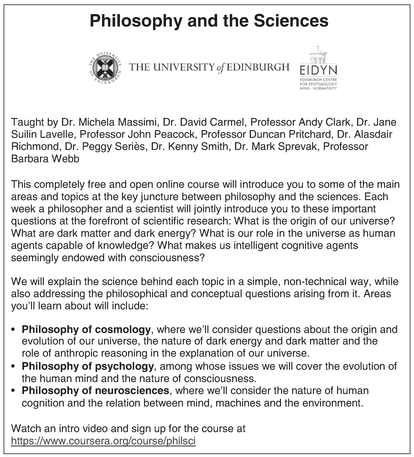
This edition published 2015
by Routledge
2 Park Square, Milton Park, Abingdon, Oxon OX14 4RN
Simultaneously published in the USA and Canada
by Routledge
711 Third Avenue, New York, NY 10017
Routledge is an imprint of the Taylor & Francis Group, an informa business
2015 David Carmel, Andy Clark, Jane Suilin Lavelle, Michela Massimi, John Peacock, Duncan Pritchard, Alasdair Richmond, Peggy Seris, Kenny Smith and Mark Sprevak
The right of David Carmel, Andy Clark, Jane Suilin Lavelle, Michela Massimi, John Peacock, Duncan Pritchard, Alasdair Richmond, Peggy Seris, Kenny Smith and Mark Sprevak to be identified as the authors of this work has been asserted by them in accordance with sections 77 and 78 of the Copyright, Designs and Patents Act 1988.
All rights reserved. No part of this book may be reprinted or reproduced or utilised in any form or by any electronic, mechanical, or other means, now known or hereafter invented, including photocopying and recording, or in any information storage or retrieval system, without permission in writing from the publishers.
Trademark notice : Product or corporate names may be trademarks or registered trademarks, and are used only for identification and explanation without intent to infringe.
British Library Cataloguing in Publication Data
A catalogue record for this book is available from the British Library
Library of Congress Cataloging in Publication Data
Philosophy and the sciences for everyone / by Michela Massimi
[and 9 others].
pages cm
Includes bibliographical references and index.
1. Science-Philosophy. I. Massimi, Michela.
Q175.P51216 2015
501-dc23
2014024531
ISBN: 978-1-138-785441 (hbk)
ISBN: 978-1-138-785434 (pbk)
ISBN: 978-1-315-767772 (ebk)
Typeset in Times New Roman
by Taylor & Francis Books
| MICHELA MASSIMI AND DUNCAN PRITCHARD |
| MICHELA MASSIMI AND JOHN PEACOCK |
| MICHELA MASSIMI AND JOHN PEACOCK |
| JOHN PEACOCK AND ALASDAIR RICHMOND |
| JANE SUILIN LAVELLE AND KENNY SMITH |
| PEGGY SERIS AND MARK SPREVAK |
| DAVID CARMEL AND MARK SPREVAK |
| ANDY CLARK |
For centuries, philosophy and the sciences have gone hand in hand. Throughout the seventeenth and the eighteenth centuries, 'natural philosophy' provided the blueprint for modern physics, chemistry, astronomy, no less than botany and medicine. Newton, for example, called his masterpiece Mathematical Principles of Natural Philosophy, and philosophical reflections about the nature of space and time played a central role in Newton's physics. In the eighteenth century, Kant's philosophical speculations about the origins of the universe led him to the nebular hypothesis, later developed by Laplace as one of the first attempts at a modern scientific explanation in cosmology. But what good is philosophy for the sciences? And what can contemporary philosophers learn from the sciences? While still at the beginning of the twentieth century, philosophy had a profound influence on the discoveries of Einstein, Bohr, and other pioneers of the time, it might seem that the dialogue between philosophy and the sciences has come to an end. After all, we live in an era where scientific research is so specialized, diversified, and run on such a large scale that - the sceptics argue - there is very little that philosophy can contribute to contemporary science.
This book is our modest attempt at proving the sceptics wrong. The dialogue between philosophy and the sciences has never been richer, more pervasive, and timely. What is the origin of our universe? What are dark matter and dark energy, and what reasons do we have for believing in their existence? Is the universe such as to allow life to evolve? Has the human mind evolved as a series of 'mini-computers', adapted to solve problems that our ancestors faced? And to what extent, is our mind - in its functioning - like a computer? What makes us conscious human beings? And what role do technology and environment play in understanding how our minds work? These are central, timely, and cutting-edge questions in contemporary science that will occupy us in the course of this book - as a journey from the cosmos, to consciousness, and computers.
Of course, this selection of topics is not intended to be a comprehensive or exhaustive introduction to the many ways in which philosophy and the sciences (broadly construed) are still engaged in a mutually beneficial dialogue (we would need a much bigger book for that). Instead, we selectively focus on some timely topics in the philosophy of the physical sciences, and the philosophy of cognitive sciences, with the hope of probing each of them a little bit deeper than a whistle-stop tour through the sciences, broadly construed, would have allowed.
Hence the book is structured in two parts. In the first part we focus on three key issues in contemporary philosophy of cosmology. We start in , we ask the question of why our universe seems to be such as to allow life to have evolved, according to the anthropic principle. We clarify what the anthropic principle says, and how these philosophical reflections may or may not find a counterpart in inflationary cosmology and the hypothesis of a multiverse.
After these chapters on philosophy of cosmology, we turn our attention to philosophy of cognitive sciences. This is a thriving area where philosophers of mind, cognitive scientists, psychologists, and linguists are joining forces to provide a better grasp of how the human mind has evolved and how it functions. We start in , we review the state of the art in the blossoming area of 'embodied cognition". This is a recent trend that has brought to the general attention the importance of going beyond the 'neurocentric' view of how our mind works, and re-evaluating the central role of technology and environment in developing our cognitive capacities.
Font size:
Interval:
Bookmark:
Similar books «Philosophy and the Sciences for Everyone»
Look at similar books to Philosophy and the Sciences for Everyone. We have selected literature similar in name and meaning in the hope of providing readers with more options to find new, interesting, not yet read works.
Discussion, reviews of the book Philosophy and the Sciences for Everyone and just readers' own opinions. Leave your comments, write what you think about the work, its meaning or the main characters. Specify what exactly you liked and what you didn't like, and why you think so.

